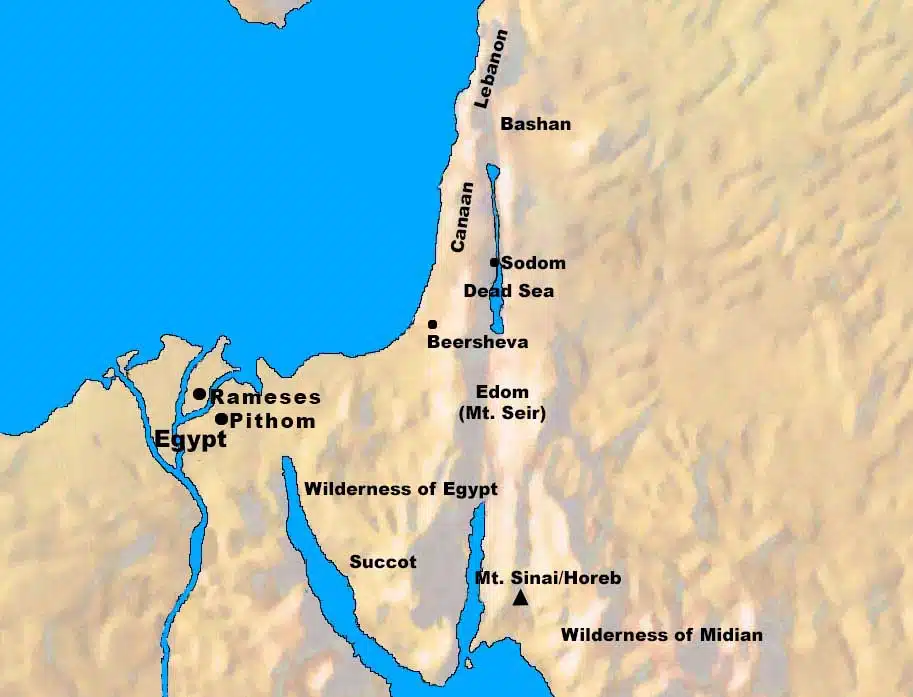After making the people drink the dust of their idol, Moses then confronted Aaron about his role in the fiasco. Aaron provided a weak explanation of what happened, telling truth mixed with falsehood.
The people had been confronted about their sin of idolatry, and now it was Aaron’s turn to be challenged by Moses. Moses asked him a simple question—What did this people do to you, that you have brought such great sin upon them? Moses presumes that Aaron would not have done this willingly, so his question of Aaron presumes the people must have done something to coerce him into this action.
Since Aaron was the high priest to the LORD, he should have made a stand against the people’s idolatrous ways. In light of this, Moses gives Aaron the benefit of the doubt, giving him an out to explain that the people had threatened, intimidated, or tricked him into making the idol. The question, however, made it very clear that it was a “great sin” that occurred.
Aaron begins his defense politely by saying do not let the anger of my lord burn. Interestingly, this is similar to Moses’ opening statement when he engaged with God in verse 11. Aaron used the Hebrew word for lord or “master” (“‘adoni,” not the word for the LORD, Yahweh), which showed politeness and respect. He does not refer to the LORD’s burning anger here.
Aaron sidesteps the opportunity to tell Moses that he was coerced, rather, he simply blames the people for the debacle. He tells Moses that you know the people yourself, that they are prone to evil. This may imply that Moses should not have been surprised at what the people did and that his burning anger was not justified. The Hebrew for prone to evil is literally “in evil it is,” and it implies that the people were inclined to do evil, that it came naturally to them.
Aaron then recounted what happened. He told Moses that they said to me, ‘Make a god for us who will go before us; for this Moses, the man who brought us up from the land of Egypt, we do not know what has become of him. This part of the story was true (see v. 1) as was Aaron’s response—I said to them, ‘Whoever has any gold, let them tear it off.’ So they gave it to me, and I threw it into the fire.
The last part of his answer to Moses seems to be pure fabrication. Aaron told Moses that after he put the gold in the fire, out came this calf. The wording here implies that a miracle happened, where Aaron threw many pieces of gold into the fire and a fully-sculpted calf idol miraculously jumped out of the fire. Perhaps Aaron is attributing the calf to the work of the LORD. This would be the latest in a long list of the LORD’s miracles starting with the plagues on Egypt, the Red Sea crossing, the daily supply of manna, and so on.
The truth was that Aaron chose to go along with the people’s idolatry when he should have known better. He played an active role, fashioning the gold into the image of a calf with manmade tools.
Amazingly, Moses did not pronounce judgment upon his brother, but rather he interceded for him to the LORD, Who wanted to kill him (Deuteronomy 9:20).
Biblical Text:
21 Then Moses said to Aaron, “What did this people do to you, that you have brought such great sin upon them?” 22 Aaron said, “Do not let the anger of my lord burn; you know the people yourself, that they are prone to evil. 23 For they said to me, ‘Make a god for us who will go before us; for this Moses, the man who brought us up from the land of Egypt, we do not know what has become of him.’ 24 I said to them, ‘Whoever has any gold, let them tear it off.’ So they gave it to me, and I threw it into the fire, and out came this calf.”
Check out our other commentaries:
-
1 Samuel 8:1-3 meaning
In his old age, Samuel appoints his sons Joel and Abijah as judges, but they judge corruptly and take money to determine outcomes....... -
Colossians 1:9-14 meaning
Paul expresses his hope for the Colossian church (and all believers) and shows how the acts of Jesus paved the way for those desires to...... -
1 Corinthians 9:19-23 meaning
Though Paul is not beholden to any man since he is not paid by man, his ministry’s purpose is to meet every person right where...... -
Numbers 3:5-10 meaning
The LORD now described the role of the Levites outside of Aaron’s line. They were to minister for the people outside the tabernacle, as well...... -
Numbers 2:25-31 meaning
The three tribes assigned to the north side of the tabernacle were Dan, Asher, and Naphtali. The number of men eligible for military service was......



